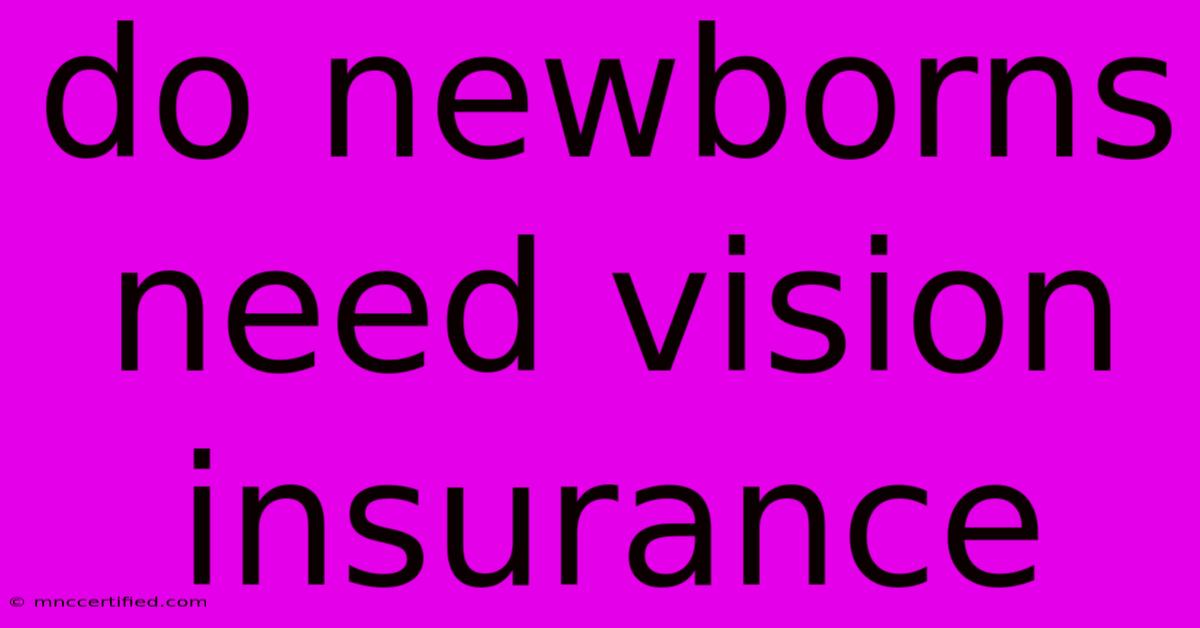Do Newborns Need Vision Insurance

Table of Contents
Do Newborns Need Vision Insurance? A Comprehensive Guide for New Parents
Congratulations on your new arrival! As new parents, you're likely overwhelmed with a million questions, and one that might be lurking in the back of your mind is: Do newborns need vision insurance? The short answer is: it's a good idea to consider it. While your little one's vision might seem perfect right now, proactive eye care is crucial for their long-term development and well-being.
Why Vision Insurance is Important for Infants
Many parents don't realize how important early detection of vision problems is. Untreated vision issues in infants can lead to significant developmental delays, impacting everything from language acquisition to social interaction. Early intervention is key to correcting these problems and ensuring your child's optimal development.
Here's why vision insurance is beneficial for newborns:
-
Early Detection of Problems: Newborn vision screenings often miss subtle issues. Regular check-ups with an ophthalmologist or optometrist, made more affordable with vision insurance, can detect problems like amblyopia ("lazy eye"), strabismus ("crossed eyes"), and refractive errors (nearsightedness, farsightedness, astigmatism) early on. Early detection is crucial for effective treatment.
-
Affordable Eye Care: The cost of pediatric eye exams and potential treatments can be substantial. Vision insurance significantly reduces these costs, making regular check-ups more accessible and less of a financial burden. This is particularly important considering the frequency of recommended visits during a child's formative years.
-
Comprehensive Coverage: Good vision insurance plans often cover more than just routine eye exams. They can also help cover the cost of glasses, contact lenses (if necessary), and even surgery in some cases. This comprehensive coverage provides financial peace of mind should your child require specialized care.
-
Peace of Mind: Knowing your child has access to quality eye care provides immense peace of mind. You can rest assured that any vision problems will be addressed promptly and effectively, minimizing potential long-term complications.
When Should You Schedule Your Newborn's First Eye Exam?
While many pediatricians perform a basic vision screening at birth, these are often limited. The American Academy of Pediatrics recommends a comprehensive eye exam by an ophthalmologist or optometrist by age six months, especially if there's a family history of eye problems or any concerns about your baby's vision. Don't delay; early intervention is key!
Finding the Right Vision Insurance for Your Newborn
Several options exist for securing vision insurance for your newborn:
-
Through your employer: Many employers offer vision insurance as part of their benefits package. Check with your HR department to see what options are available.
-
Individual plans: You can also purchase an individual vision insurance plan directly from an insurance provider. Compare different plans to find one that best fits your budget and needs.
-
Medicaid and CHIP: If you qualify, Medicaid and the Children's Health Insurance Program (CHIP) can provide affordable or free vision care for your child.
Choosing the right plan involves careful consideration of factors such as coverage amounts, network of providers, and cost. Research and compare different options before making a decision.
Don't Neglect Your Newborn's Vision Health
While it might seem unnecessary at first, investing in vision insurance for your newborn is a wise decision. It offers peace of mind, early detection capabilities, and financial protection against potentially costly eye care expenses. Prioritizing your child's vision health from the start lays the groundwork for a lifetime of healthy sight. Talk to your pediatrician or a vision care professional to determine the best course of action for your child.
Keywords: newborn vision insurance, infant eye care, pediatric ophthalmologist, pediatric optometrist, vision screening newborn, amblyopia, strabismus, refractive errors, lazy eye, crossed eyes, nearsightedness, farsightedness, astigmatism, vision insurance benefits, affordable eye care, children's health insurance, Medicaid, CHIP.

Thank you for visiting our website wich cover about Do Newborns Need Vision Insurance. We hope the information provided has been useful to you. Feel free to contact us if you have any questions or need further assistance. See you next time and dont miss to bookmark.
Featured Posts
-
How Much Is A 100 000 Surety Bond
Nov 18, 2024
-
Illinois Updated Football Rankings
Nov 18, 2024
-
What Channel Is Chargers Sunday Night Football On
Nov 18, 2024
-
Bentancurs Seven Game Ban Explained
Nov 18, 2024
-
Watch Ravens Vs Steelers Game
Nov 18, 2024